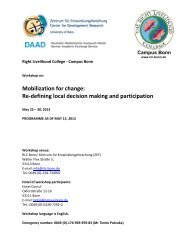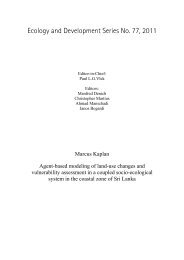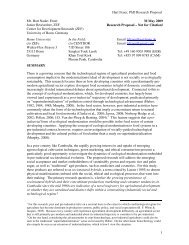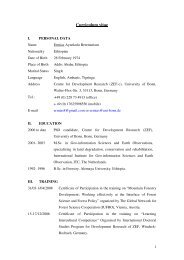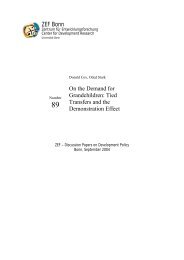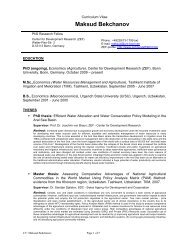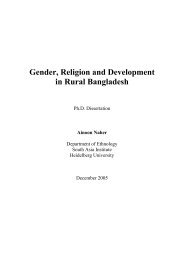Karuna Trust, Karnataka - ZEF
Karuna Trust, Karnataka - ZEF
Karuna Trust, Karnataka - ZEF
Create successful ePaper yourself
Turn your PDF publications into a flip-book with our unique Google optimized e-Paper software.
Good and Bad Practices in Microinsurance<strong>Karuna</strong> <strong>Trust</strong>, India1.1 Role of the State in InsuranceThe Constitution of India assigns the responsibility for various issues to the Union (thefederal government also called “central government”), to the State (any of the individualStates), or to both. Insurance is a federal task. The Constitution assigns “incorporation,regulation and winding up of trading corporations, including banking, insurance and financialcorporations, but not including cooperative societies” to the union’s responsibilities. The stateis involved in the “incorporation, regulation and winding up of corporations (other than thosespecified in the Union list), and […] other societies and associations; cooperative societies.”Both, Union and State(s), have concurrent competences regarding “bankruptcy andinsolvency” for all entities not further specified, including trade unions, social security andsocial insurance, as well as charities and charitable institutions.The insurance industry was nationalized in India, life insurance in 1956 and general insurancein 1973. In 1999, the insurance market reopened for (limited) competition with the entry ofprivate companies, following the establishment of the Insurance Regulatory andDevelopment Authority (IRDA) by an Act of Parliament.Established by the federal government, the IRDA has extensive duties, powers andcompetencies to regulate, promote and ensure growth of the insurance and re-insuranceindustry, including licensing, contractual conditions, standards for qualifications ofmanagement and intermediaries, operational affairs and supervision. IRDA also has theauthority to launch investigations and conduct inspections of licensed insurance companies atany time it deems fit, and can cancel the registration or close down an insurance firm.The central government is empowered to bypass the IRDA in policy related issues (Section18, IRDA Act 1999) and may act and supersede IRDA under various conditions, e.g., in the“public interest” (Section 19 IRDA Act 1999).An “insurance company” in India means any company formed and registered under theCompanies Act 1956 whose sole purpose is to carry on insurance or re-insurance business. Aforeign company (defined under the Income-Tax Act,) can own a maximum of 26% of thepaid-up equity capital of an Indian insurance company. The law prohibits composites of lifewith other types of insurance (e.g. liability, fire); health insurance can, however, be sold withlife insurance or with general insurance and can be provided to individuals or groups.A cooperative society registered under the Cooperative Societies Act 1912 can operate lifeinsurance or general insurance under State regulation (not federal). Cooperative societies,mutual insurance companies and provident societies are allowed to provide insurance as nonprofitorganizations. They are explicitly mentioned in the Insurance (Amendment) Act 2002,which integrated the IRDA Act (1999) with the Insurance Act (1938).There is some opaqueness in the Insurance Amendment Act 2002 regarding cooperativesocieties. Section 2, subsection 8A, stipulates that on matters of capital requirements andforeign ownership, cooperatives registered on or after the commencement of the Insurance(Amendment) Act 2002 must comply with the conditions applying to insurance companiesunder the Companies Act. However, Section 96 of this act explicitly states that the (huge)paid-up capital requirements for registration and capital deposits do not apply to mutualinsurance companies and cooperative life insurance societies.2



